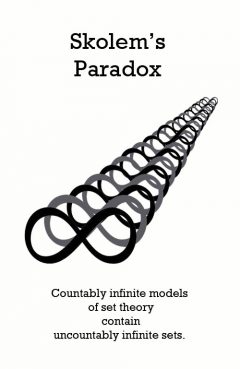Skolem's Paradox

Release Date: //1922
Country of Release:
Length:
MPAA:
Medium: Paradox
Genre:
Release Message: Countably infinite models of set theory contain uncountably infinite sets. Authored by Thoralf Skolem.
Description: In mathematical logic and philosophy, Skolem's paradox is a seeming contradiction that arises from the downward L wenheim-Skolem theorem. Thoralf Skolem (1922) was the first to discuss the seemingly contradictory aspects of the theorem, and to discover the relativity of set-theoretic notions now known as non-absoluteness. Although it is not an actual antinomy like Russell's paradox, the result is typically called a paradox, and was described as a "paradoxical state of affairs" by Skolem (1922: p. 295). Skolem's paradox is that every countable axiomatisation of set theory in first-order logic, if it is consistent, has a model that is countable. This appears contradictory because it is possible to prove, from those same axioms, a sentence which intuitively says (or which precisely says in the standard model of the theory) that there exist sets that are not countable. Thus the seeming contradiction is that a model which is itself countable, and which contains only countable sets, satisfies the first order sentence that intuitively states "there are uncountable sets". A mathematical explanation of the paradox, showing that it is not a contradiction in mathematics, was given by Skolem (1922). Skolem's work was harshly received by Ernst Zermelo, who argued against the limitations of first-order logic, but the result quickly came to be accepted by the mathematical community. The philosophical implications of Skolem's paradox have received much study. One line of inquiry questions whether it is accurate to claim that any first-order sentence actually states "there are uncountable sets". This line of thought can be extended to question whether any set is uncountable in an absolute sense. More recently, the paper "Models and Reality" by Hilary Putnam, and responses to it, led to renewed interest in the philosophical aspects of Skolem's result.